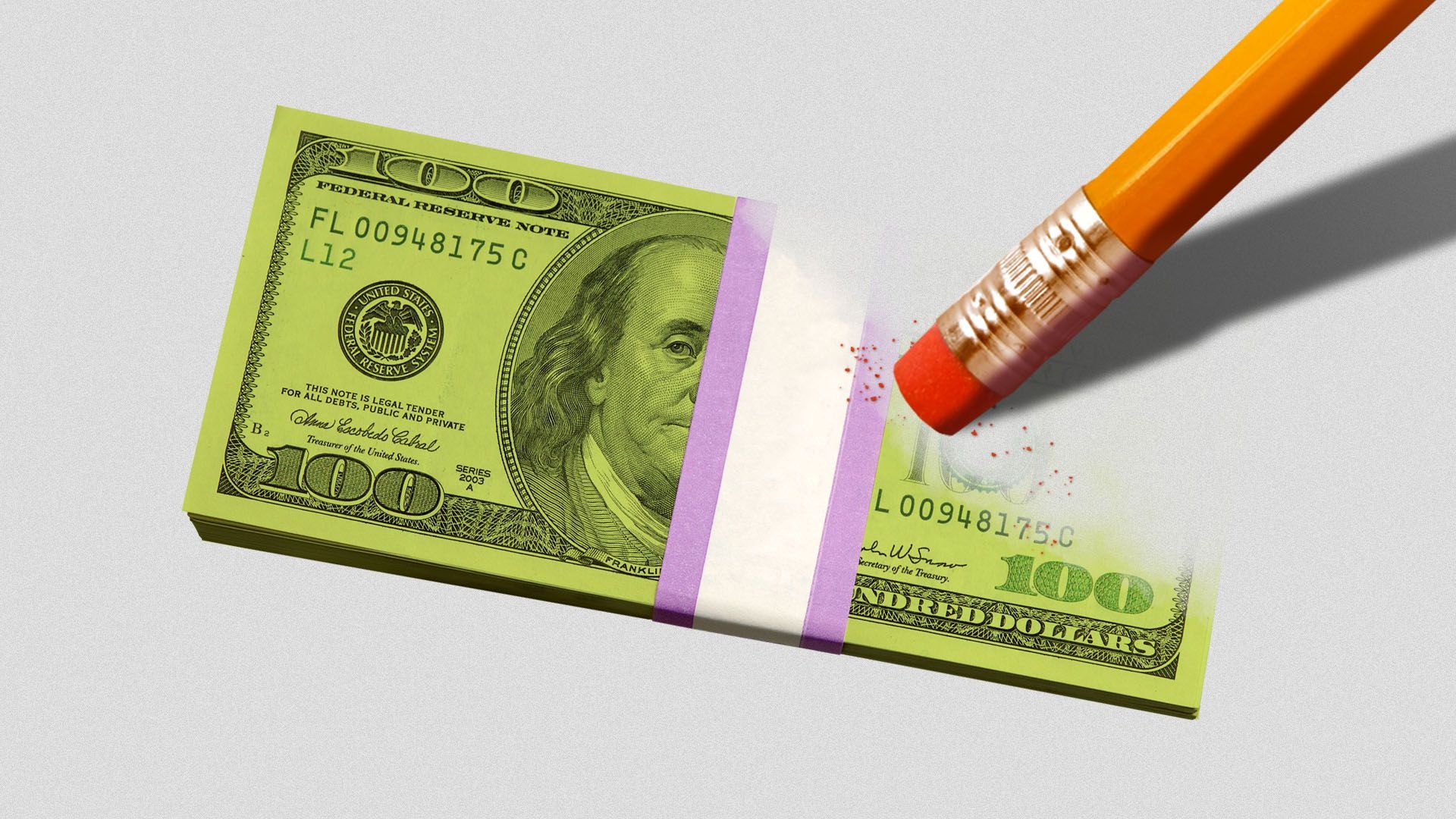from Daystar
Devaluing the U.S. Dollar: How to Make America Poorer Again
by Daniel Lacalle
Mises.org
 In recent days, we have read numerous articles about a possible agreement between the US administration and its main trading partners to devalue the US dollar. It has been named “The Mar-A-Lago Accord”, a concept inspired by the Plaza Accord of 1985, which aimed to devalue the US dollar to address trade imbalances. That plan failed.
In recent days, we have read numerous articles about a possible agreement between the US administration and its main trading partners to devalue the US dollar. It has been named “The Mar-A-Lago Accord”, a concept inspired by the Plaza Accord of 1985, which aimed to devalue the US dollar to address trade imbalances. That plan failed.
The objective, according to the financial media, would be to weaken the US dollar, boost US export competitiveness, and rebalance global trade. Another proposal involves restructuring US debt by swapping existing obligations for longer-term bonds, such as 100-year Treasury bonds, to ease fiscal pressures. However, this would be a dangerous and potentially counterproductive idea.
The Mar-A-Lago Accord concept starts from two wrong premises, which are to believe that US exports are not large enough due to a strong currency and that debt is too high because of a robust US dollar. Both are simply incorrect.
Fed’s Kugler: Making Sure Inflation Doesn’t Rise is Priority
by Reuters
Kitco
 April 7 (Reuters) – Federal Reserve Governor Adriana Kugler on Monday said that some of the recent rise in goods and market-services inflation may be “anticipatory” of the effect of the Trump administration’s current policies, adding that it’s a “priority” for the Fed to keep inflation in check.
April 7 (Reuters) – Federal Reserve Governor Adriana Kugler on Monday said that some of the recent rise in goods and market-services inflation may be “anticipatory” of the effect of the Trump administration’s current policies, adding that it’s a “priority” for the Fed to keep inflation in check.
“If you think about tariffs, for example, this measure of core import prices but also the shortages index may be really important to consider” in modeling what drives inflation, Kugler said at Harvard University at the conclusion of a lecture on inflation dynamics.
“We, all colleagues at the Fed, are very committed still to our 2% target and want to keep inflation expectations well anchored, which should be a priority now,” Kugler said, noting that short-term inflation expectations have risen but longer-term they remain well-anchored. “It should be a priority to make sure that inflation doesn’t move up.”
Bonds Slump but Short-Term Treasurys Hold Steady as Tariffs Heighten Stagflation Fears
‘We stay underweight long-term Treasurys,’ says BlackRock
by Christine Idzelis
Market Watch

Exchange-traded funds that hold short-term Treasurys, such as the SPDR Bloomberg 1-3 Month T-Bill and iShares 1-3 Year Treasury Bond ETF, closed Monday about flat, according to FactSet data.
The broader U.S. bond market finished the trading session in the red, with the Vanguard Total Bond Market ETF posting a sharp 1.2% drop, as traders appeared to weigh the risk of tariffs increasing inflation as well as slowing growth under a stagflationary scenario. Longer-term Treasurys were particularly hard hit, with the iShares 20+ Year Treasury Bond ETF slumping 3% on Monday.
Stagflation is America’s Most ‘Optimistic Scenario’ at This Point, Former Fed President Says
Stagflation might be the best-case America can hope for amid Trump’s tariffs, former Fed president Bill Dudley said.
by Filip De Mott
Yahoo! Finance

Bill Dudley, former president of the New York Federal Reserve Bank, says only one question remains: how bad will the damage be?
Whereas a “Goldilocks economy” seemed alive and well at the start of this year, tariff policy has flipped the economic outlook in a matter of days.
Writing in a Bloomberg opinion piece, Dudley said he expects devastating consequences from the White House’s across-the-board tariffs. As dwindling demand derails US growth, 5% inflation is likely in the next six months, he said.
Stagflation Fear Gives Way to Recession Fear
by Neil Irwin
Axios
 Just nine days ago, we wrote about the signs pointing to an imminent stagflation. It’s time to revise that outlook; now, a plain ol’ recession looks more likely.
Just nine days ago, we wrote about the signs pointing to an imminent stagflation. It’s time to revise that outlook; now, a plain ol’ recession looks more likely.
The big picture: The shifts in global markets since President Trump’s tariff announcement last Wednesday carry the unmistakable signs of a looming downdraft in economic activity that would bring inflation, interest rates, and job market conditions with it.
— In effect, there has been a push-and-pull over whether the inflationary impact of higher import taxes will prove more powerful than the disinflationary impact on economic activity.
— When Trump announced tariffs far larger than Wall Street was expecting — and followed up with rhetoric suggesting few off-ramps that might lead to their reversal anytime soon — the smart money tilted toward that recessionary/disinflationary outlook.
State of play: Despite higher import taxes that economists widely believe will push consumer prices up in the near term, bond markets are pricing in medium-term inflation that is lower than anticipated a week ago.
America May Be Headed for This Rare Type of Economic Crisis
Stagflation, explained.
by Eric Levitz
Vox
 President Donald Trump’s decision to impose large tariffs on all foreign imports has triggered a global trade war, stock market collapse — and predictions of an imminent recession.
President Donald Trump’s decision to impose large tariffs on all foreign imports has triggered a global trade war, stock market collapse — and predictions of an imminent recession.
In the wake of Trump’s tariff announcement last week, JP Morgan raised its odds of a US recession to 60 percent, up from 40 percent. Other banks have similarly adjusted their economic forecasts downward.
What makes these forecasts even more disconcerting, however, is that the US is at risk of slipping into an especially dreadful type of recession: one characterized by “stagflation” — meaning, the simultaneous presence of stagnant growth, rising inflation, and elevated unemployment.
Here is a brief guide to what stagflation is, why it’s so feared, how it occurs, and whether Trump’s policies will cause it.
Trump’s Tariffs Will Not Cause Inflation
by Spencer P. Morrison
American Thinker
 On April 2, Liberation Day, President Trump imposed reciprocal tariffs across the board. The President noted that they were “kind” tariffs, since they were only half the rate that American producers are charged. For now, at least.
On April 2, Liberation Day, President Trump imposed reciprocal tariffs across the board. The President noted that they were “kind” tariffs, since they were only half the rate that American producers are charged. For now, at least.
Critics have lamented that tariffs will raise the cost of goods, as if the Constitution codified the right to buy “cheap” Chinese goods.
While there will be an adjustment period — as with any major policy shift — tariffs will not cause inflation in the long term. In fact, they will likely lower the cost of goods over time.
Asleep at the Wheel
Over the last fifty years, the American people have been subjected to an experiment with economic globalism. This has hollowed out American industries, destroyed millions of jobs, and endangered America’s national security. The one benefit that the public as promised was that goods would be cheap — that the cost of living would go down.
Next Up For Markets: A Crisis of Confidence in the Dollar
Dollar on Thursday posted biggest daily fall since November 2022
by Dhara Ranasinghe, Alun John and Gertrude Chavez-Dreyfuss
Reuters.com
 LONDON, April 4 (Reuters) – In times of market panic investors tend to rush to the safety of the dollar, but when stocks swooned in response to U.S. tariffs this week, they ran away from it. Investors say it’s a sign that the greenback’s global standing may be eroding.
LONDON, April 4 (Reuters) – In times of market panic investors tend to rush to the safety of the dollar, but when stocks swooned in response to U.S. tariffs this week, they ran away from it. Investors say it’s a sign that the greenback’s global standing may be eroding.
The dollar, for decades a safe haven, on Thursday fell about 1.7% in its biggest daily drop since November 2022, after President Donald Trump imposed tariffs on imports at levels not seen since the early 1900s. Stock markets also tanked, as tariffs ignited recession worries.
In interviews and published markets commentaries, many investors and analysts pointed to the Trump administration for the anomaly. Its protectionist policies, upending of the global economic order in place since World War II, and a growing U.S. debt pile have been chipping away at the dollar’s appeal, they say.
This Economic Paradox Nearly Took Down Three Presidents. Is Donald Trump Next?
The economic crisis of the 1970s was a disaster for multiple presidents. It could be worse for Trump.
by Joshua Zeitz
Politico

In the leadup to President Donald Trump’s “Liberation Day” on Wednesday — when he announced sweeping new tariffs on all the United States’ international trading partners — economists and financial analysts started using a word that will give hives to those of you over the age of 60.
Stagflation — “the s-word rippling through Wall Street and Main Street,” as Axios put it earlier this week — is a calamitous anomaly whereby the economy manifests low growth and high inflation at the same time. Anyone who remembers the 1970s will recall that it caused an economic crisis in the United States, ushering in a turbulent era of high prices, interest rates and unemployment — and considerable instability and pain.
Today, experts are worried that Trump’s new tariff regime — which is all but certain to raise prices — coupled with a tight labor market could return us to that era. As a researcher at Deutsche Bank recently observed, “The data is continuing to support the narrative of weaker growth and higher inflation, with market-based inflation expectations continuing to rise.”
The End of the Petrodollar Era: Trump’s Trade War and the Twilight of American Exorbitance
by David Russell
GoldSeek
 The grey, damp dawn of July 1974 mirrored the mood aboard the 8am flight departing Andrews Air Force Base. William Simon, America’s new Treasury Secretary, and his deputy, Gerry Parsky, carried the weight of a nation in crisis.
The grey, damp dawn of July 1974 mirrored the mood aboard the 8am flight departing Andrews Air Force Base. William Simon, America’s new Treasury Secretary, and his deputy, Gerry Parsky, carried the weight of a nation in crisis.
The official story spoke of economic diplomacy, a standard tour through Europe and the Middle East – handshakes and banquets masking the grim reality. But beneath the diplomatic veneer pulsed a secret, urgent mission, known only to President Nixon’s innermost circle. The oil weapon, wielded by Arab nations in retaliation for the Yom Kippur War, had crippled the US. Prices quadrupled, inflation raged, markets tumbled, and the economy spiralled. Simon’s carefully orchestrated European stops were merely a prelude.
The real objective lay hidden within a four-day pause in the Saudi coastal city of Jeddah. There, far from public view, Simon faced a task veiled in uncertainty: to somehow defang the oil threat and convince a kingdom, flush with petrodollars yet wary of America, to fund its staggering deficit. The stakes were immense, the outcome anything but certain.
